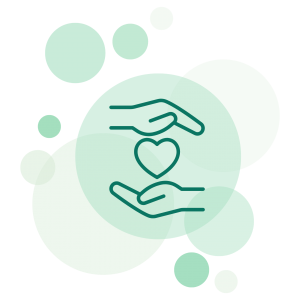Understanding Depression
Information & Resources
What is Depression?
Common symptoms, types & treatment
Depression is a common but serious mood disorder that negatively impacts how a person feels, the way they look at the world, think and behave. Depression can adversely influence individuals’ quality of life, livelihoods, basic functioning, and relationships with others. It can affect anyone, occurring in approximately 1 in 15 adults every year and approximately 1 in 6 people will experience it at some stage during their life. Additionally, depression can occur alongside disorders such as anxiety and chronic illnesses.
Feeling down or experiencing sadness at times is a normal part of life and most people will go through sad or upsetting events during their life. But it’s important to note that if you’re feeling down or hopeless on a regular basis or these feelings are impacting your quality of life, it may be time to seek support with a healthcare or mental health professional.
Common Symptoms of Depression
Depression is complex and affects people in very different ways. Symptoms can vary from mild to severe depending on the individual. Common symptoms of depression include:
Feelings:
- Sad or having a depressed mood.
- Overwhelmed or indecisive.
- Worthless or guilty.
- Irritable or frustrated.
- Lack of confidence or loss of self-worth.
- Disappointed.
Thoughts:
- Of being a failure.
- Of everything being your fault.
- Nothing good ever happens to you.
- Of being worthless.
- Of being better without you.
- Of death or suicide.
Behaviours:
- Not going out anymore.
- Loss of interest or pleasure in activities once enjoyed.
- Not getting work done (work, school, etc).
- Difficulty thinking, concentrating, or making decisions.
- Withdrawing from friends and family.
- Increase in purposeless physical activity (e.g., inability to sit still, pacing, handwringing) or slowed movements or speech (these actions must be severe enough to be observable by others).
- Relying on drugs or alcohol.
Physical Changes:
- Changes in appetite — weight loss or gain unrelated to dieting.
- Trouble sleeping or sleeping too much.
- Constant fatigue or feeling ill and rundown.
- Headaches and muscle pain.
- Stomach pain, butterflies, or churning gut.
Types of Depression
Major Depressive Disorder
When typically thinking of depression, you are probably thinking of Major Depressive Disorder (MDD), which is when you experience the symptoms mentioned above most of the time. To be diagnosed with you must:
- experience symptoms most day
- last for at least two weeks
- negatively impact multiple areas of life
Melancholia
This is a severe form of depression which includes physical symptoms.
Psychotic Depression
Occasionally, someone may also experience psychosis, which includes hallucinations, delusions, or paranoia.
Antenatal/prenatal and postnatal depression
Risk of developing depression increases during pregnancy or during the first year of giving birth. Around 10% of women experience depression during pregnancy and 16% during the first three months of having a baby.
Dysthymic disorder
Long-term depression is similar to MDD however it is less severe and lasts at least two years.
Bipolar disorder
Individuals with bipolar experience periods of depression along with periods of mania and normal moods in between. It affects around 2% of Australians.
Seeking Support
It is important to remember that if you are diagnosed with depression or are experiencing these symptoms, that you are not alone and support is available for you.
Depression is considered a serious medical condition that can get worse without proper treatment. If left untreated, depression can negatively impact your life, including social, family, work, and personal aspects. This higlights the importance of seeking help and speaking with a healthcare or mental health professional if you are experiencing symptoms.
Making an Appointment with Axis Clinic
To make an appointment with one of our experienced psychologists, counsellors or mental health social workers please contact our helpful reception team on 07 3254 0333 so that we can support you further.
Outlook for Depression
Depression can be a temporary or long-term condition that requires ongoing management. It’s important to note that treatment does not necessarily make your depression go away, however, treatment can often help to make symptoms of depression more manageable in the long-term to improve your quality of life.
5 Self-Care Tips to Support You
1. Relaxation and Mindfulness techniques
It is important to be conscious in the present moment and to have an open and receptive attitude. Learning and regularly practising relaxation techniques will help reduce stress including breathing.
Techniques you can use include:
- Deep/abdominal breathing
- Mindfulness meditation
- Progressive muscle relaxation
- Imagery
2. Physical activity and time in nature
Physical exercise is a proven effective treatment for depression. This does not need to be intense; it could be as simple as getting your body moving and going for a walk around your neighbourhood. Even just sitting outside in the sunlight can recharge your body and give you an energy boost.
3. Diet change
What many people don’t know is that food can have a big impact on your mood! It’s important to eat food that you love while fuelling your body with what it needs. Some foods which are shown to help include leafy greens, capsicum, pumpkin, fish, eggs and dairy products. Trying new recipes and creating nutritious meals that you love, is a fun way to explore new flavours and light up your taste buds.
4. Journaling
People may be sceptical of this tip, and while it may not work for everyone, this is a great activity to try. Journaling enables you to express any feelings you may not be able to get out in words or share with other people. It is a place where you can release unhelpful thoughts so that you can move forward. However, the focus should be on your successes and positive moments and how they made you feel. This is a great spot to practice positive self-talk. For example, you can write down positive affirmations.
5. Engage in activities you love or find a new hobby!
Sometimes it can be hard to feel motivated to do anything at all. But, giving yourself the opportunity to try something new or do something you love may foster that love for life. These activities can be as big or small as you like! Choose something you’ve always wanted to do; you won’t regret it. We’ve listed some suggestions below:
- Weekly unwind night with a face mask and favourite movie or a bath
- Reading (so many great books to immerse yourself in)
- Learning a new language
- Paint classes or simple colouring-in books
- Joining Pilates or a sporting team
- Collecting things such as stamps or shells.
- Meeting new people through peer support groups
- Gardening or repairing things
Download the PDF Tip Sheet
Check out our tip sheet on creating a self-check-in practice
References
Fun activities to help improve your mood. (n.d.). Retrieved July 28, 2023, from https://www.healthywa.wa.gov.au/Articles/F_I/Fun-activities-to-help-improve-your-mood
Kvam, S., Kleppe, C. L., Nordhus, I. H., & Hovland, A. (2016). Exercise as a treatment for depression: A meta-analysis. Journal of Affective Disorders, 202, 67–86. https://doi.org/10.1016/j.jad.2016.03.063
LaChance, L. R., & Ramsey, D. (2018). Antidepressant foods: An evidence-based nutrient profiling system for depression. World Journal of Psychiatry, 8(3), 97–104. https://doi.org/10.5498/wjp.v8.i3.97
Mindfulness based cognitive behavioural therapy really works! (n.d.). St Patrick’s Mental Health Services. Retrieved July 28, 2023, from https://www.stpatricks.ie/media-centre/blogs-articles/2014/february/mindfulness-based-cognitive-behavioural-therapy-really-works
Self-Care for Depression: 10 Tips to Help You Feel Better. (2012, January 18). Psych Central. https://psychcentral.com/depression/self-care-for-depression
Signs and symptoms of depression—Beyond Blue. (n.d.). Retrieved July 28, 2023, from https://www.beyondblue.org.au/mental-health/depression/signs-and-symptoms?gclid=CjwKCAjwq4imBhBQEiwA9Nx1Bn6taSHdK_ZkvaJRzc2W4QP6Qizld8nxvE_ghIQgG-Mh5QtxyINanBoCYNUQAvD_BwE
Sohal, M., Singh, P., Dhillon, B. S., & Gill, H. S. (2022). Efficacy of journaling in the management of mental illness: A systematic review and meta-analysis. Family Medicine and Community Health, 10(1), e001154. https://doi.org/10.1136/fmch-2021-001154
Suicide & self-harm monitoring data. (2023, March 20). Australian Institute of Health and Welfare. https://www.aihw.gov.au/suicide-self-harm-monitoring/data/suicide-self-harm-monitoring-data
Types of depression—Beyond Blue. (n.d.). Retrieved July 28, 2023, from https://www.beyondblue.org.au/mental-health/depression/types-of-depression
What Is Depression? (n.d.). Retrieved July 28, 2023, from https://www.psychiatry.org:443/patients-families/depression/what-is-depression


